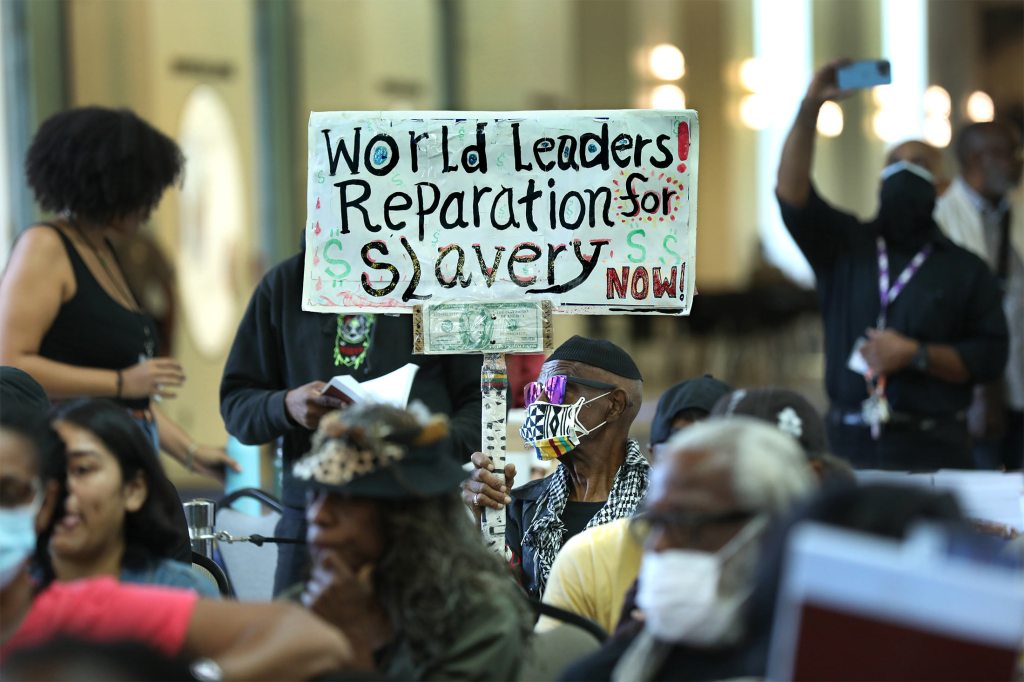George Floyd, a Black man who had been detained by Minneapolis police after a store clerk alleged he had used a counterfeit $20 bill, died as Officer Derek Chauvin knelt on his neck for more than nine minutes, ignoring Floyd’s complaints that he could not breathe.
A video of Floyd’s May 25, 2020 death triggered massive protests throughout the nation and across the globe, energizing the Black Lives Matter movement that had been founded in 2013.
Four months after Floyd’s death, California Gov. Gavin Newsom signed three bills to address, he said, “the scourge of racial injustice rooted in the legacy of slavery and systemic racism,” including one authorizing a nine-member task force to study reparations for Black Californians.
“As a nation, we can only truly thrive when every one of us has the opportunity to thrive,” Newsom declared. “California’s rich diversity is our greatest asset, and we won’t turn away from this moment to make right the discrimination and disadvantages that Black Californians and people of color still face.”
Three years later, in 2023, the task force produced a 1,060-page report that catalogued California’s discriminatory treatment of Black people after its 1850 admission as a state that officially prohibited slavery. The report recommended “appropriate remedies of compensation, rehabilitation, and restitution for African Americans, with a special consideration for African Americans who are descendants of persons enslaved in the United States.
“Compensation should be provided for any economically assessable damage, as appropriate and proportional to the gravity of the violation and the circumstances of each case,” the task force wrote.
The report identified a series of reparations amounts for various purposes, with some estimates amounting to $360,000 for each of the 1.8 million Black Californians deemed to have enslaved ancestors. That would total nearly $650 billion — about twice the state’s annual budget.
News coverage of the eye popping figure put Newsom on the spot. He responded with what political pros call a slow roll — seeming to support something but finding excuses to delay actually doing the something.
Initially Newsom said in a statement that “dealing with the legacy of slavery is about much more than cash payments,” but when news media suggested he was backing away from his implied 2020 support of reparations, he issued another statement to the Sacramento Bee:
“The sensationalized framing in pieces published by outlets like Fox News and others is inaccurate. The governor looks forward to reviewing the final report — and all recommendations — when complete.” Newsom’s chief communication advisor, Anthony York, said that the cash payments issue “will be resolved” after Newsom meets with legislative leaders later in the year.
Two years later, the slow roll continues.
Black legislators have submitted many bills to implement pieces of the 2023 report, but without Newsom’s support, none has broached cash reparations, and he has been very selective about which bills he accepts. Last year, he vetoed a bill that would have allowed descendants of slaves seek redress for Black-owned land seized by public agencies.
This year, the Legislature’s Black Caucus introduced 16 bills in its “Road to Repair” agenda. A few made it to Newsom’s desk, and he vetoed five of them. Two he signed give up to $6 million to the state university system to study ways of identifying descendants of slaves and create a Bureau for Descendants of American Slavery to fashion a reparation structure.
Effectively, Newsom’s slow roll protects him from taking any meaningful actions, thus bequeathing reparations to his successor, like his many other unresolved California issues.
From a purely political standpoint it makes perfect sense. Newsom’s governorship is drawing to a close. He obviously wants to become president of the United States, and financial reparations are not popular nationally.
Dan Walters is a CalMatters columnist.

